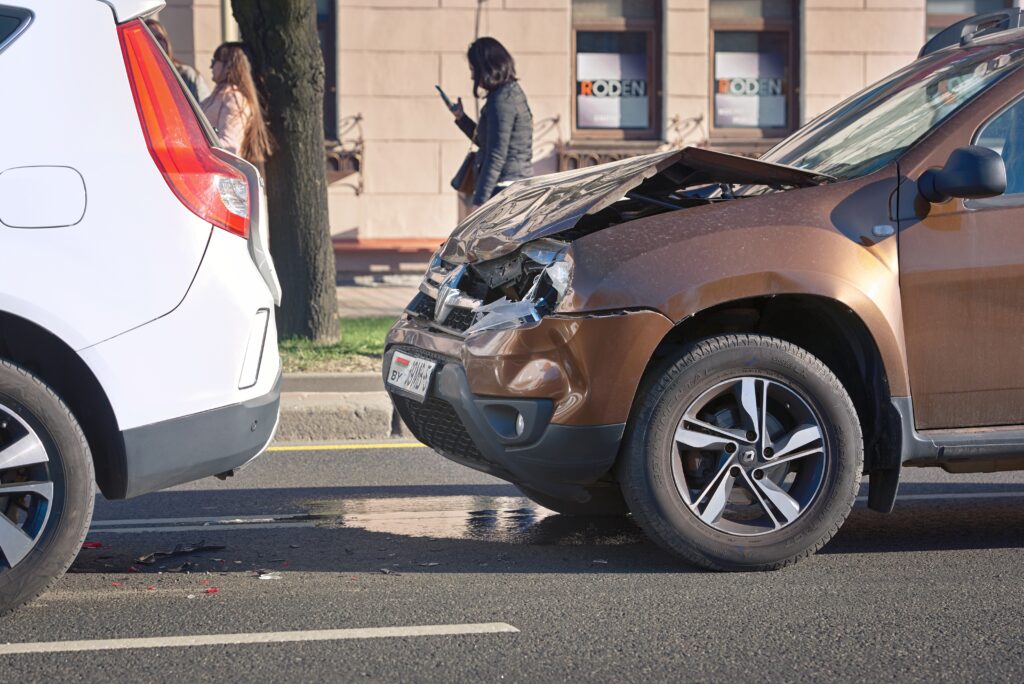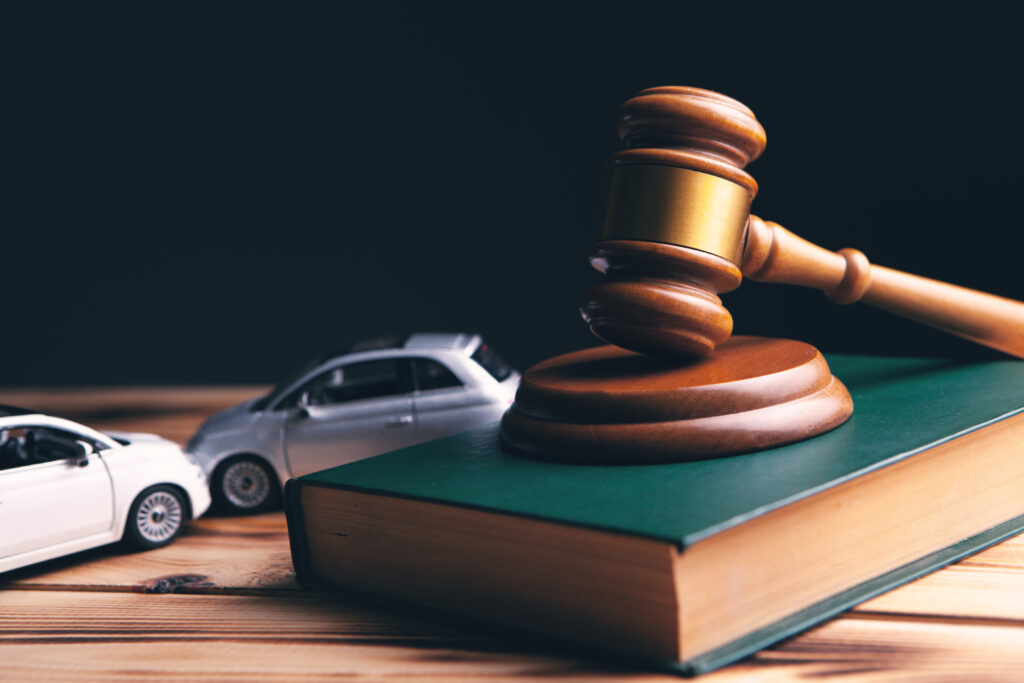
Rear-end collisions are among the most common types of traffic accidents in the United States, accounting for nearly one-third of all roadway crashes. Rear-end crashes can trigger devastating, life-changing injuries, including head injuries, shattered bones, spinal injuries, etc. You need serious compensation to cover your medical bills, lost income, and pain and suffering, so don’t dream of taking on the insurance company alone.
Turn to Maze Law Offices. We have obtained millions in settlements and verdicts for our car accident clients because we fought for them in insurance negotiations and in court. Our personal injury law firm doesn’t rely on paralegals to communicate with clients—every car accident lawyer in Richmond talks to clients personally.
A rear-end collision occurs when one vehicle crashes into the back of another. These accidents typically happen when a trailing driver fails to stop or slow down in time. While they often occur at intersections, traffic signals, or in stop-and-go traffic, rear-end collisions can happen on highways, rural roads, and even in parking lots.
In the majority of cases, the rear driver is presumed at fault because every driver has a legal duty to maintain a safe following distance. However, there are exceptions — for example, if the front driver reversed suddenly, failed to maintain functioning brake lights, or made an abrupt and unexpected stop without reason.
Rear-end crashes can happen for many reasons, but most stem from driver inattention or negligence. Some of the leading causes include:
Smartphones have become one of the biggest hazards on the road. Texting, browsing, adjusting GPS, or even eating while driving can cause a driver to take their eyes off the road for just a few seconds — enough time to miss a stopped vehicle ahead.
Following another car too closely reduces reaction time. If the lead vehicle brakes suddenly, the trailing driver often cannot stop in time. Tailgating is especially dangerous at high speeds or in heavy traffic.
The faster a vehicle is traveling, the longer it takes to stop. Speeding not only increases the risk of a rear-end crash but also magnifies the impact force and potential injury severity.
Rain, ice, and snow can make roads slippery, increasing stopping distances. Drivers who fail to adjust their speed in poor conditions may easily cause their vehicle to slide into the one in front of them.
A driver who stops abruptly — for example, to avoid hitting an animal or debris — can trigger a chain reaction of rear-end collisions, especially in congested traffic.
Brake failure, worn tires, or broken taillights can also lead to rear-end crashes. In such cases, liability may extend to vehicle manufacturers or repair shops.
The consequences of a rear-end collision often extend far beyond the initial crash. What may seem like a minor accident can trigger a chain of financial, physical, and emotional burdens that last for months or even years.

In addition to medical bills, many victims experience lost income from time away from work or reduced productivity during recovery. Some injuries — such as chronic neck or back pain — may permanently limit future earning capacity, creating a lasting economic strain. On top of that, the costs of vehicle repair or replacement, along with the hassle of dealing with insurance claims, add more stress during an already difficult time.
The personal toll can be just as heavy. Victims often endure significant pain and suffering, emotional distress, anxiety, or depression stemming from the trauma of the crash. When chronic pain or disability limits daily activities, it leads to a loss of enjoyment of life. Without an experienced attorney, many victims settle for compensation that barely scratches the surface of these lifelong consequences.
Insurance companies are profit-driven businesses. Their goal is to pay as little as possible, even in legitimate claims. Some of their common tactics include:
Adjusters often argue that a low-speed collision couldn’t cause serious harm. They might claim your symptoms are exaggerated or unrelated to the accident.
Soon after a crash, insurers may request a recorded statement. Victims, still in shock or pain, sometimes make innocent remarks that are later twisted to imply partial fault or minor injury.
Insurers might stall the claims process, hoping victims become frustrated and settle for less. In some cases, they deny claims outright, forcing victims to fight back legally.
If you’ve ever had a prior neck or back issue, the insurance company might argue that your pain was not caused by the crash — even if the accident clearly aggravated your condition.
Some insurers offer an immediate settlement soon after the accident, before the full extent of your injuries is known. Accepting early can prevent you from claiming future medical costs or lost income.
These tactics underline why having a car accident lawyer on your side is essential. A knowledgeable attorney knows how to counter insurance strategies and fight for what you’re truly owed.
When you’re injured in a rear-end crash, dealing with insurance companies, medical providers, and legal paperwork can feel overwhelming. A car accident attorney takes on these challenges for you, protecting your rights and ensuring that you receive full and fair compensation for everything you’ve lost. Here’s how they make the difference:
While fault in rear-end accidents is often presumed to rest with the trailing driver, proving liability can become complex. Insurance companies may argue that the lead driver stopped suddenly, had malfunctioning brake lights, or shared some responsibility. A skilled lawyer collects and analyzes evidence such as:
By presenting a clear and compelling narrative, your attorney ensures that fault is accurately assigned and that the responsible party—and their insurer—cannot shift the blame to you.
One of the most vital steps in a personal injury claim is thorough documentation of your injuries and financial losses. Insurance companies frequently undervalue claims because victims cannot provide sufficient proof of their damages. Your attorney ensures that every detail is recorded, including:
Beyond medical evidence, your lawyer compiles proof of economic damages such as pay stubs, tax returns, and employment records to calculate lost income and diminished earning capacity. Non-economic losses like pain, emotional distress, and reduced quality of life are also carefully evaluated and supported with statements from doctors, family members, and therapists.
A major advantage of hiring a car accident lawyer is having a professional negotiator who understands insurance company tactics. Adjusters often make lowball offers to close cases quickly, betting that victims are too stressed or financially pressured to push back.
Your attorney acts as your shield and advocate—handling all communications with insurers, submitting the required documentation, and rejecting unfair offers. Lawyers who focus on car accidents know the value of similar cases and can back their demands with solid evidence and legal precedent. If the insurance company refuses to negotiate in good faith, your lawyer can escalate the matter through formal litigation.
Most rear-end collision cases settle outside of court, but some require litigation to achieve justice. If negotiations fail, your lawyer will file a personal injury lawsuit, manage pre-trial procedures such as discovery and depositions, and present your case before a judge or jury.
An experienced trial lawyer understands how to make your story resonate—explaining how the collision occurred, detailing your medical journey, and illustrating the human impact of the crash. The mere presence of a capable trial attorney often motivates insurers to offer higher settlements to avoid courtroom risk.
In the aftermath of a rear-end crash, victims often struggle with mounting medical bills. Some providers demand payment up front, while others place liens on future settlements. Your lawyer helps you coordinate with healthcare providers, ensuring bills are delayed or negotiated until compensation is secured.
This not only relieves financial stress but also prevents debt collectors from harassing you during the recovery process. Once the case concludes, your attorney ensures that all medical liens are properly paid from the settlement, protecting you from future disputes.
Ultimately, the goal of a car accident lawyer is to maximize your compensation by accounting for every element of your loss. A strong claim includes:
By analyzing the full scope of your injuries, your car accident lawyer ensures that you’re compensated not just for what you’ve lost today but for what you might continue to lose in the future.

Did another driver’s negligence cause a rear-end collision that injured you? Don’t talk to the insurance company without a qualified auto accident lawyer. Maze Law Offices has recovered millions for our car accident clients over the years by providing fierce advocacy in insurance negotiations and in the courtroom. Speak to our personal injury attorneys in Richmond today at (859)882-9999 to schedule a free consultation.
In most cases, the driver who hits the vehicle in front is considered at fault. Every driver has a legal duty to maintain a safe following distance and pay attention to traffic flow. However, there are exceptions — for example, if the front driver reversed suddenly, had no working brake lights, or made an unpredictable stop without reason.
Absolutely. Many injuries, such as whiplash or concussions, don’t show symptoms right away. A prompt medical evaluation creates an official record of your condition, which is essential for both your health and any future insurance or legal claim.
Yes. A skilled car accident lawyer investigates the crash, gathers medical evidence, calculates the full value of your damages, and negotiates aggressively with insurance companies. Studies consistently show that injury victims represented by lawyers recover significantly higher settlements than those who go it alone.
Every case is unique. Simple claims may settle in a few months, while complex cases involving serious injuries or disputed liability can take a year or more. Your attorney will work to resolve your case efficiently but will not rush to settle for less than it’s worth.
Settlement amounts vary widely depending on the severity of injuries, medical expenses, lost income, and long-term effects. Minor soft-tissue cases might settle for a few thousand dollars, while severe spinal or traumatic brain injuries can lead to six- or even seven-figure settlements. A lawyer can help calculate a fair value based on your specific damages.
